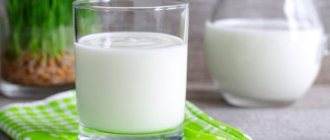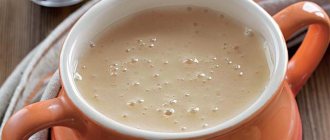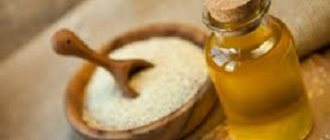Bloating often occurs due to the accumulation of gases in the intestines. This can occur as a result of many pathological processes and the consumption of certain foods.
If kefir causes your stomach to swell, use anti-flatulence medications and adjust your diet.
Why does your stomach bloat from dairy products?
On the one hand, most nutritionists claim: kefir and its fermented milk “relatives” are useful for the functioning of the gastrointestinal tract. Since they contain lactobacilli, they inhibit the growth of pathogenic microflora in the intestines, which causes bloating and gas.
But on the other hand, there is a category of people for whom it is fermented milk products that cause flatulence. This is possible due to several factors. Lactic acid serves as an irritant to the intestinal mucosa, which causes bloating. In addition, lactobacilli in kefir can trigger undesirable reactions and gas formation in the digestive organs.
Most often, bloating is caused by the wrong combination of foods.
Kefir, fermented baked milk and other similar products should not be combined with other foods (with the exception of fruits and cereals). Nutritionists and gastroenterologists also strongly do not recommend combining dairy products with baked goods. Such a “union” will cause excessive gas production and excessive distension in the intestines.
The starter culture used to make lactic acid products can provoke the formation of gases and flatulence. Another reason why the stomach is often swollen is lactose intolerance (milk sugar), an invariable component of all dairy products. In this case, experts advise consuming mature fermented milk products. It is recommended to drink kefir and fermented baked milk on the 3rd day after production. This aging almost completely eliminates lactose from these drinks.
Contraindications
It should be understood that a fermented milk drink such as kefir is not a medicine. In case of poisoning, you can drink it only after the main symptoms of acute infection have disappeared and only with the permission of the attending physician. Do not self-medicate under any circumstances, as this may aggravate the situation and lead to irreversible consequences. But there are contraindications that exclude the possibility of using kefir in case of poisoning:
- childhood - up to one year of age, it is strictly forbidden to give fermented milk products to a child due to the indigestibility and intolerance of casein protein;
- increased acidity of the stomach - gastritis, stomach ulcers are among the main contraindications;
- chronic diarrhea - due to the laxative effect of fermented milk product, people prone to diarrhea and intestinal disorders should not consume kefir. This will only worsen the diarrhea and ultimately lead to dehydration;
- allergies and individual intolerance to milk protein - such patients are strictly prohibited not only from consuming kefir, but also any other fermented milk products. This can cause irreversible consequences.
Can kefir cause bloating?
The condition when the stomach swells from kefir is also quite possible. The reason is intolerance to this particular product or lactose in its composition.
But even in this case, nutritionists are unanimous. Although kefir can provoke flatulence, it is very useful for the digestive process, so experts advise either reducing the amount of kefir you consume, or drinking an exclusively aged lactose-free drink. There is no reason to put a taboo on this product!
Mechanism and causes of excess gas formation
A person who has nothing to do with medicine often believes that he is bloated only because he “ate something wrong.” Yes, foods play an important role in the process of gas formation, but they are not the only provocateur of flatulence.
Thus, in children under one year of age, “gas” often accumulates, which then causes colic. The reason is a deficiency of enzymes in the gastrointestinal tract. There are also many factors that can cause excessive gas formation in the intestines of an adult.
Diseases
The intestines may become swollen due to problems with the release of gases caused by various pathologies.
Intestinal obstruction
This phenomenon can be encountered with volvulus, neoplasms in the peritoneum. Obstruction is also provoked by the entry of a bulky foreign body or by spasm.
Dysbacteriosis
Appears when bacteria that contribute to the digestion of food in the intestines die. This often occurs due to poisoning or long-term use of antibiotics.
Pathologies of the pancreas
Enzyme deficiency causes a slowdown in the digestion process. Because of this, food rots in the intestines, releasing significant amounts of gas.
Eating habits
There are products that provoke excessive gas formation:
- fruits, especially apples;
- any varieties of cabbage;
- mutton;
- legumes
Sometimes flatulence occurs due to a congenital lack of digestive enzymes. Active gas formation is possible when consuming foods with gluten (for example, wheat) or dairy products. Indigestibility of milk is often observed in young children, but sometimes this feature becomes lifelong.
Most people get bloated from fresh milk and are much less likely to get bloated from kefir.
Many people know that fermented milk products eliminate digestive problems, and do not cause them, so this last fact may be puzzling. But there is nothing strange about this. It has been established that fresh kefir, made less than 24 hours ago, has a laxative effect and can provoke flatulence, while a three-day drink activates peristalsis.
Often, bloating is the result of an incorrectly organized nutrition process. Most people eat while running, also taking in air. It has been proven that about 50% of gases enter the intestines with food.
Hormones
Hormonal levels also affect the functioning of the gastrointestinal tract. Due to endocrine disorders, both acceleration and deceleration of peristalsis are possible. In women, such problems occur much more often than in men. Bloating in women mid-menstrual cycle is common. It is associated with the active production of progesterone instead of estrogen, which reduces contractions of the muscles of the uterus and intestines.
In addition, the phenomenon of flatulence is possible during pregnancy. After all, when carrying a child, the female body experiences a double load: the baby’s pressure on the pelvic organs and parallel restructuring of the entire body. So during this time, bloating and constipation are a common problem.
Medications
Enterosorbents allow you to quickly overcome intestinal bloating. These pharmacological agents adsorb and remove gases and toxins from the gastrointestinal tract. Their main disadvantage is that, together with gases, enterosorbents promote the excretion of minerals and vitamins. The most popular sorbents are Enterosgel, activated carbon, Smecta, Atoxil.
The next group of medications that can improve the patient’s well-being with bloating are antifoams. Their action is based on the destruction of gas bubbles, and this leads to its absorption and free exit from the intestine. Simethicone, which is part of the drugs Maalox plus and Espumisan, is one of the most popular defoamers.
Abdominal bloating appears when there is a disruption in the functioning of the gastrointestinal tract, adhesions, as well as due to a diet containing large amounts of sweets, fresh fruits and vegetables, legumes, whole cow's milk and carbonated drinks. In this case, discomfort occurs after eating.
According to doctors, bloating in most cases develops when intestinal motor function is impaired, for example, with IBS. In this syndrome, swelling occurs due to increased sensitivity of intestinal receptors.
In addition, any disease in which the movement of masses through the intestines is disrupted, for example, colon cancer or Crohn's disease, can be accompanied by bloating. Finally, even excessive consumption of fatty foods can cause bloating, even without increased gas formation. This is due to a deterioration in the transport of food from the stomach to the intestines.
In addition, bloating can have serious causes, such as intestinal obstruction, hernia, helminthic infestation, and liver disease. Therefore, if the problem becomes protracted and is accompanied by severe pain, you should contact a gastroenterologist to identify and eliminate the true cause of the pathological phenomenon.
Treatment of bloating from kefir
Since this condition is not uncommon, ways to combat this unpleasant phenomenon have long been found. Everyone chooses the best option for themselves, but the integrated use of methods significantly speeds up the solution to the problem.
Nutrition correction
In case of occasional cases of flatulence, it is enough to avoid foods that provoke fermentation and gas formation. These include:
- bread;
- apples;
- legumes;
- grape;
- smoked meats;
- beer and wine;
- dried fruits;
- fatty meats;
- confectionery.
During the period of especially active gas formation, it is recommended to eat boiled or stewed vegetables (carrots, beets), porridges cooked in water, lean meat and fish. You should eat 4-6 times a day, while simultaneously drinking a sufficient amount of still water. You can also drink kefir, if you do not combine it with other products.
Bloating exercises
Sometimes it’s quite simple to activate your intestines - you just need to move more. But you don’t have to sign up for a gym to do this. It is enough to do simple exercises. For example:
- exercise “bicycle” (flexion and extension of legs bent at the knees in a lying position);
- rocking on a ball (lying on your stomach);
- yoga classes.
A light self-massage of the abdomen will also not hurt. To do this you need:
- take a “lying on your back” position;
- place a cushion under your neck and bend your legs at the knees;
- warm up your hands a little and place them on your stomach;
- Next, you need to stroke it clockwise, pressing slightly on the navel area;
- do the same movements on the sides.
Medications
The choice of medications to eliminate bloating will directly depend on the cause of gas formation. Several groups of funds are used.
Sorbents
Indicated for intoxication of the body, which is indicated by gases with an unpleasant odor and the presence of nausea. Activated carbon, Atoxil and Enterosgel are often used.
Medicines to eliminate gas bubbles in the intestines
Of the drugs in this group, Espumisan is most often used. Analogues that can replace this drug: Bobobtik, Disflatil, Infacol.
Probiotics
These products contain live bacteria that help normalize digestion. As a rule, Linex or Biolact is prescribed.
Synthetic enzymes
They are indispensable for pancreatic pathologies. But enzyme products cannot be taken regularly, as the intestines may stop working independently. Effective drugs include Creon, Mezim and Pancreatin.
Additionally, medications are prescribed to improve motor skills. Doctors recommend using Motilium, Brullium, Domperidone and other drugs with similar effects.
Sometimes bloating is caused by an intestinal infection. Then the patient is prescribed antibiotics and drugs that help eliminate spasms, for example, No-shpu.
Phytotherapy
Alternative treatments may also be helpful for flatulence. Basically, in such cases, they resort to infusions and decoctions of herbs that have carminative properties. It could be:
- dill;
- fennel;
- chamomile;
- carrot seeds.
As a rule, take 1 teaspoon of herbal raw materials and steam it in 250 ml of water. This tea is consumed for several days. Moreover, this method is effective and safe even for very young children. But if flatulence is a constant concern and is associated with painful sensations, then you need to urgently visit a doctor to rule out serious gastrointestinal pathology. After all, some of them, for example, intestinal obstruction, can be fatal.
Nutrition correction
If a person constantly experiences bloating, he needs to reconsider his diet. You need to avoid the following products:
- grapes and other sweet berries;
- apples;
- all legumes;
- sweets, in particular flour products;
- all types of bakery products;
- fatty meats;
- smoked meats;
- dried fruits;
- beer;
- wine.
To prevent bloating, you should eat more boiled and stewed foods, vegetables (especially beets and carrots), lean meat and fish. Small meals (up to 6 times a day) and normal drinking regimen are required.
Flatulence caused by kefir is very easy to cure by correcting the diet and prescribing sorbents. A properly selected diet is of great importance.
If a person drinks kefir, then he should not eat it with incompatible foods, because this will increase the manifestations of flatulence.
If bloating does not go away, then you should consult a doctor who will prescribe special medications.











